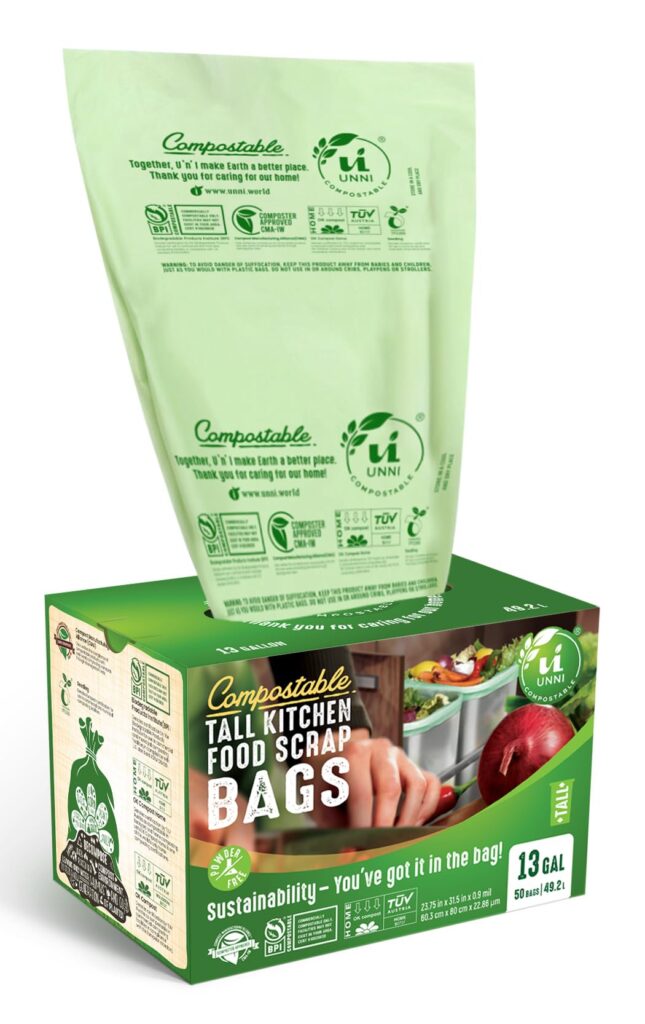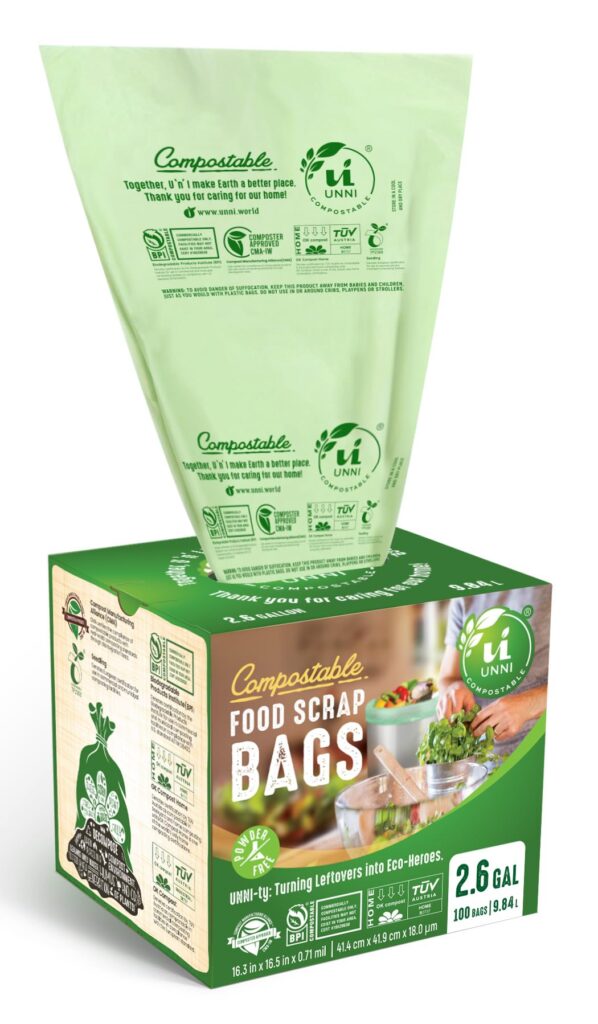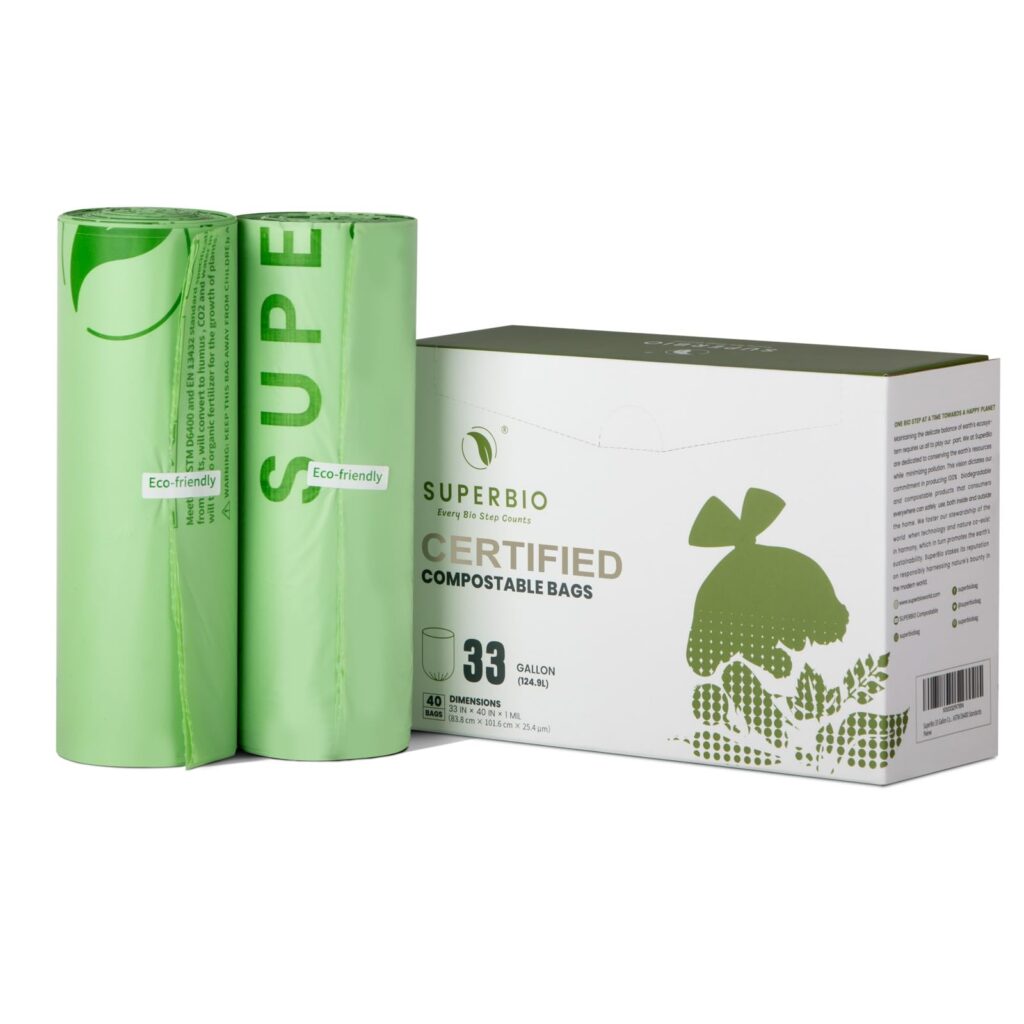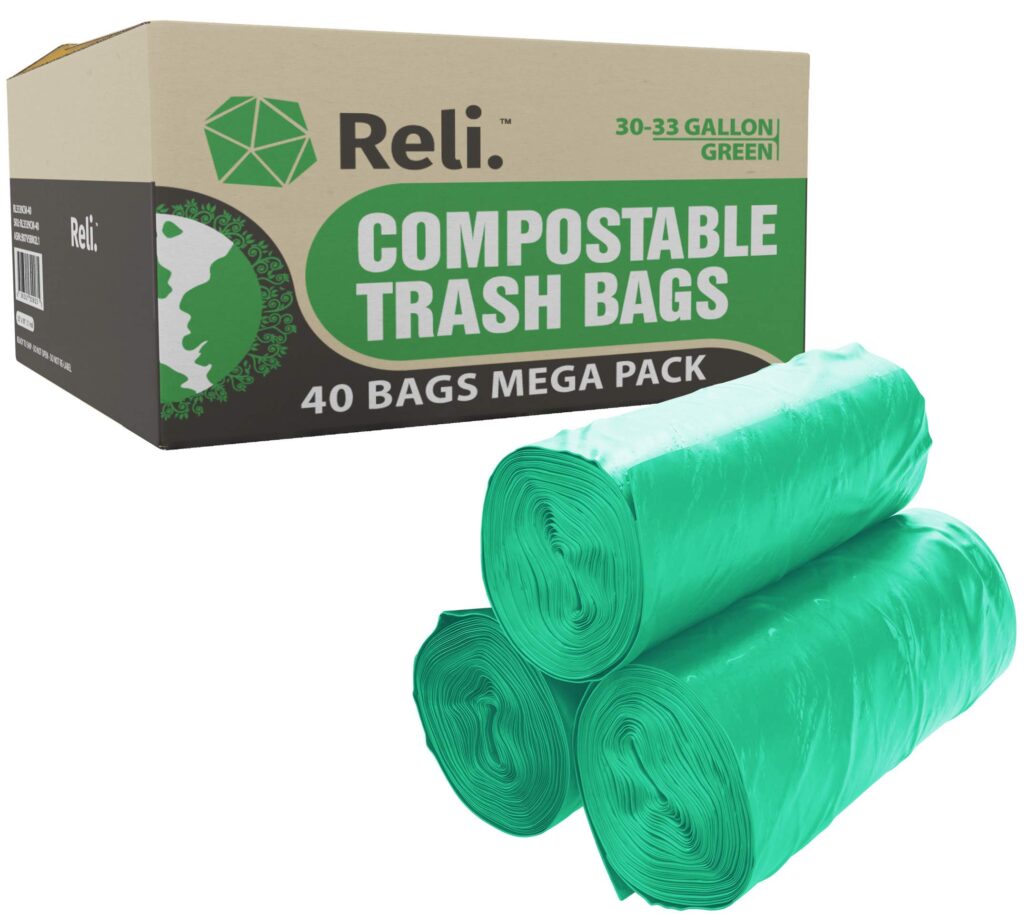Compostable garbage bags offer an environmentally friendly way to handle waste. Made from materials that can break down naturally, these bags reduce the impact on landfills. Unlike regular plastic bags, compostable bags decompose more easily, making them a good choice for eco-conscious consumers.
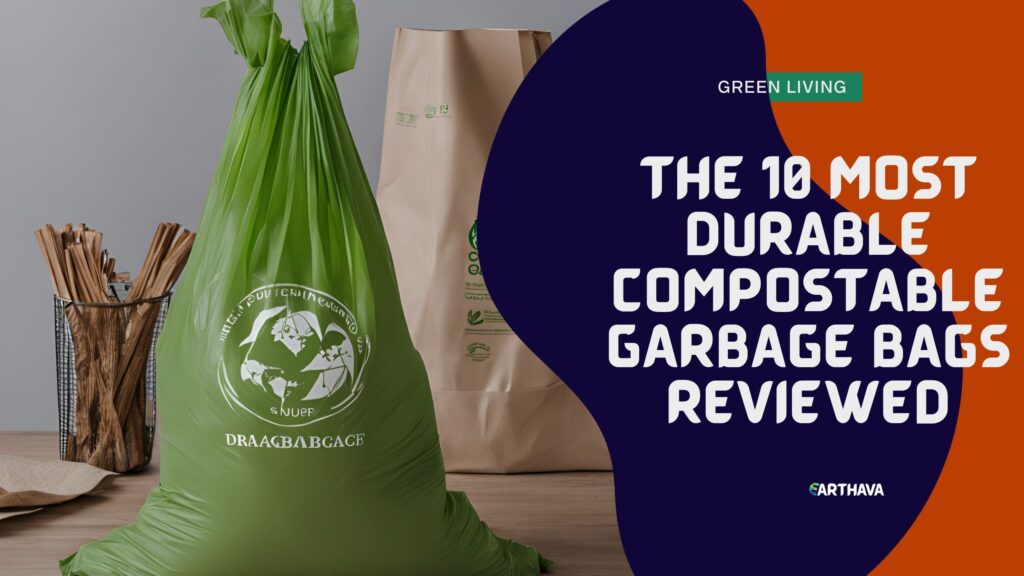
Several factors are important when choosing compostable garbage bags. The material is key; look for bags made from plant-based materials like cornstarch or potato starch. Check the size to ensure it fits your trash bin. Also, consider the bag’s strength to avoid leaks and tears.
With the growing concern over plastic waste, compostable garbage bags provide a simple way to make a positive impact. We spent extensive hours researching the best compostable garbage bags to help you make an informed decision.
Best Compostable Garbage Bags
Below is our full list of the best compostable garbage bags. We have carefully reviewed these products to help you make an informed choice.
1. AYOTEE: ECO-Friendly Trash Bags

AYOTEE compostable garbage bags offer a great eco-friendly solution for your trash needs.
Pros:
- Durable and strong
- Eco-friendly materials
- Fits various bin sizes
Cons:
- Not suitable for backyard composting
- May be pricier than regular bags
- Slightly thinner than traditional plastic bags
We’ve recently tested AYOTEE Compostable Garbage Bags and were impressed with their strength and flexibility. These bags did not tear even when they were packed with heavy waste, which makes them very reliable for daily use.
The eco-friendly nature of these bags is another big selling point. Made from natural renewable plant starch, they help reduce our carbon footprint. Using these bags made us feel like we are contributing to a cleaner environment.
Though a bit pricier compared to standard plastic trash bags, the benefits make them worth trying. These compostable bags are a step towards a sustainable future, combining functionality with environmental care.
2. UNNI: Sustainable Garbage Bags
These bags stand out for their environmental friendliness and durability.
Pros:
- Strong and durable
- Certified compostable
- Made from plant starches
Cons:
- Slightly more expensive
- Might need to be stored properly
- Not as sturdy as regular plastic bags
We’ve recently used the UNNI Compostable Garbage Bags and found them to be a fantastic choice for eco-conscious users. They are strong and durable, handling our regular trash without any tears or leaks. The fact that they’re certified compostable adds a level of trust to their sustainability claims.
We also appreciate that these bags are made from plant starches. It makes us feel good about reducing our plastic use while still having a reliable trash bag. They fit perfectly in our standard kitchen bin without issues.
There are a few things to consider, though. These bags are a bit pricier than traditional plastic ones. It’s also important to store them properly to avoid degradation. While not quite as sturdy as regular bags, they hold up well enough for household use.
The UNNI Compostable Garbage Bags offer a great balance between convenience and environmental responsibility. We recommend giving them a try if you’re looking to make a greener choice.
3. UNNI: Compostable Liner Bags
For anyone looking to reduce plastic waste in their home, these UNNI Compostable Liner Bags are an excellent choice.
Pros:
- Strong material, doesn’t easily tear
- Certified compostable, eco-friendly
- Fits perfectly in small trash cans
Cons:
- Can rip if overstuffed
- Requires cool, dry storage
- May need double bagging for very wet waste
These compostable bags from UNNI are really practical for anyone wanting to compost or just minimize their environmental footprint. The bags are strong enough for general kitchen waste and fit my small kitchen trash can perfectly. We’ve found them to be very reliable, rarely tearing under normal use.
Storage is key with these bags as they need to be kept in a cool, dry place to maintain their strength and durability. Sometimes, if we pack the bag full, it can tear, but for regular kitchen scraps including fruit peels and vegetable waste, they hold up well. For especially wet or heavy scraps, we occasionally double bag to prevent leaks.
Using these bags feels like a step in the right direction for sustainability. It’s great to know that they’re certified for compostability in the U.S. and Europe. Plus, it’s reassuring to think that by using them, we’re helping to keep our planet cleaner and healthier for future generations. Whether for kitchen scraps or general small waste, these UNNI compostable liner bags are a solid and responsible choice.
4. SUPERBIO: 33 Gallon Yard Waste Bags
These bags are a strong and eco-friendly solution for managing yard waste and other organic trash.
Pros:
- Sturdy and tear-resistant
- Certified compostable
- Easy to use
Cons:
- Fragile when wet
- Limited shelf life
- Mixed packaging
We found the SUPERBIO 33 Gallon Yard Waste Bags to be a reliable choice for handling yard waste. They are sturdy and can hold a substantial amount of trash without tearing. The bags have multiple certifications making them a true compostable choice for eco-conscious consumers.
On the downside, it’s essential to avoid putting wet trash in them because the bags tend to shred when damp. They also have a shelf life of around a year, so it’s important to store them properly.
Nonetheless, these bags are handy and convenient for yard waste and other organic materials. They are easy to dispense and use, providing an excellent alternative to traditional plastic bags. The combination of strength, eco-friendliness, and convenience make these bags a worthwhile purchase for anyone looking to reduce their environmental impact.
5. SUPERBIO: Compostable Garbage Bags
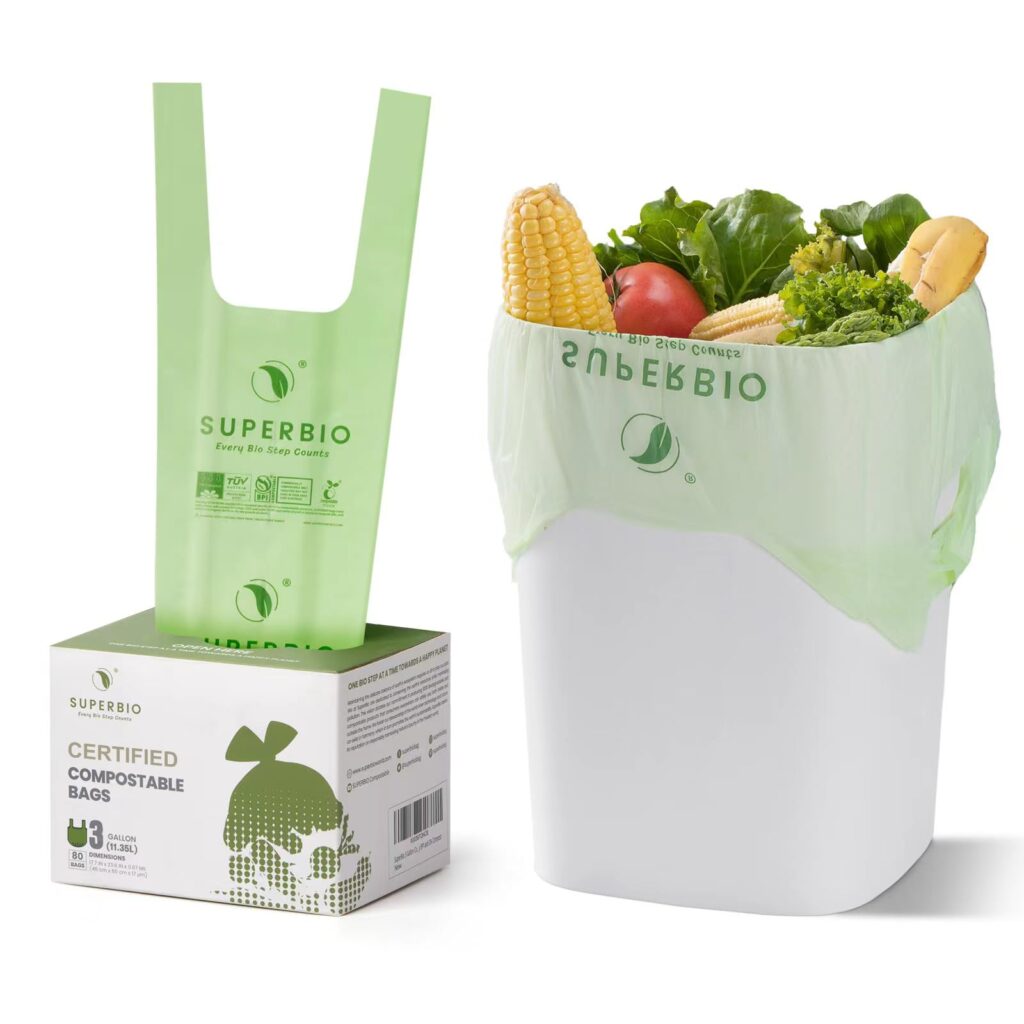
These compostable garbage bags are a great choice for those looking to make an environmentally-friendly switch.
Pros:
- Strong and tear-proof
- Convenient handle tie
- Certified compostable
Cons:
- Limited shelf life
- Not suitable for very hot waste
- Packaging may vary
We’ve been using the SUPERBIO Compostable Garbage Bags in our kitchen, and they’ve held up well. The bags reliably support our food scraps without any leaks or tears, a big plus compared to other compostable options we’ve tried.
The handle tie feature makes it easy to close the bags securely, even when they’re full. This small design element really helps with carrying and disposing of the bags.
These bags are designed to break down, which means they’re not meant to last forever. To get the best results, store them away from heat and use them within their one-year shelf life. When filled with waste, try to dispose of them within three days to avoid any issues.
6. Reli: Compostable 33 Gallon Trash Bags
These trash bags balance eco-friendliness with durability for your composting needs.
Pros:
- Strong and tear-resistant
- Eco-friendly and compostable
- Large capacity
Cons:
- Prone to tearing when wet
- May need double bagging for heavy loads
- Slightly more expensive
These Reli. Compostable 33 33-gallon trash Bags are pretty impressive when it comes to being eco-friendly. They are made from 30% plant-based materials and are ASTM-D6400 certified, so you know they’ll break down properly in the right composting facilities. They’re a great step toward reducing our plastic footprint.
In terms of durability, these bags are pretty solid. We’ve used them for both kitchen scraps and yard waste and found them to hold up well. The 33-gallon capacity is more than enough for most household and garden tasks. The bags tear off the roll easily, which saves us time and hassle.
On the downside, they can be a bit tricky when it comes to very heavy or wet loads. We’ve noticed that they might rip if they get too wet or heavy, so sometimes we use two bags for extra security. Overall, they do a good job and offer a more sustainable option for composting.
7. GreFusion Compostable Garbage Bags
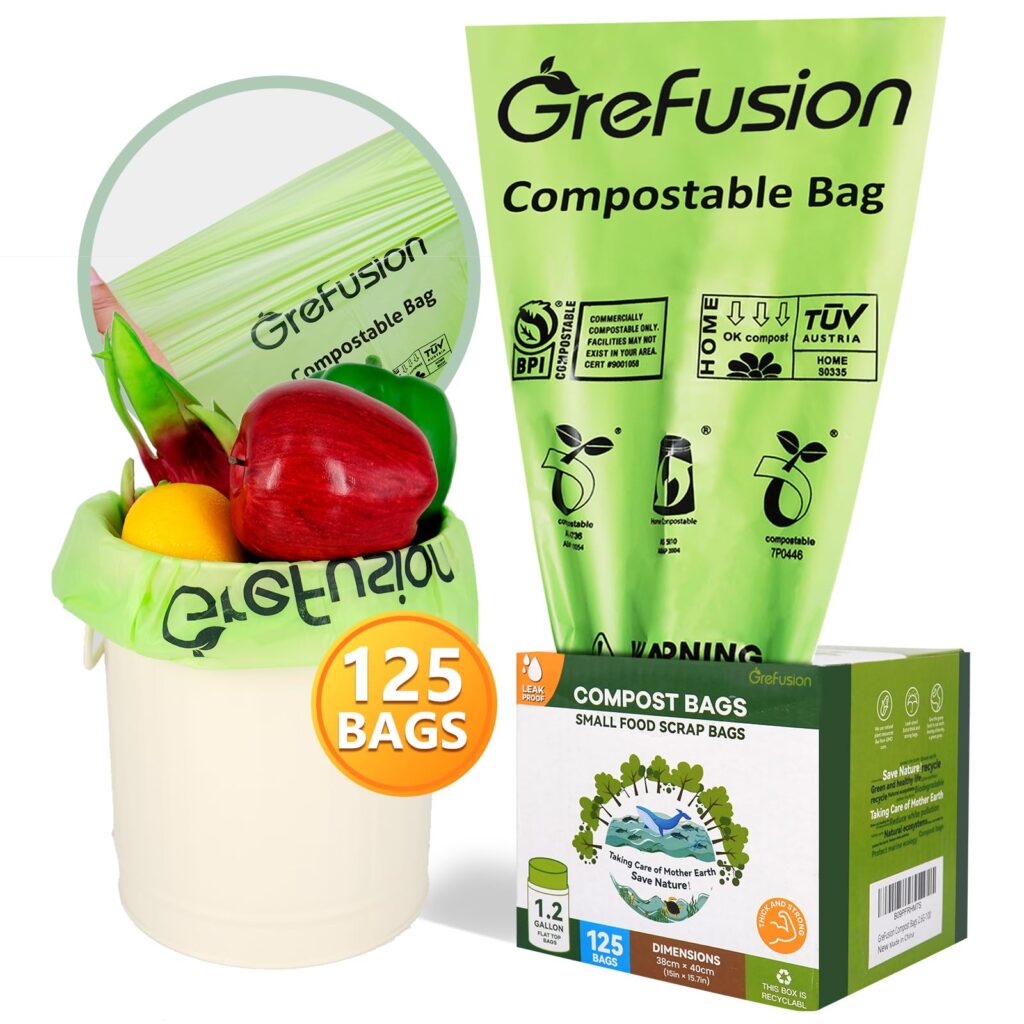
We recommend these compostable garbage bags for their reliability and eco-friendliness.
Pros:
- Durable and tear-resistant
- Control unpleasant odors
- Certified compostable
Cons:
- Slightly thin and may “sweat”
- Higher price point
- Limited to small bins
We’ve tried the GreFusion Compostable Garbage Bags and found them impressive for daily use. The bags hold up well to kitchen scraps and bathroom waste without tearing. They’re perfect if you want to manage your compost with minimal mess.
Using these bags, we noticed that they contain odors effectively. Our kitchen remained fresh, and we didn’t have to deal with any unpleasant smells. Plus, knowing they are BPI and ASTM certified reassures us that we are making an environmentally friendly choice.
Though the bags can feel a bit thin and occasionally “sweat,” we appreciate their strength and durability. They are more expensive than regular plastic bags, but their benefits in waste management and environmental impact make them worth considering.
8. SUPERBIO: Compostable Garbage Bags
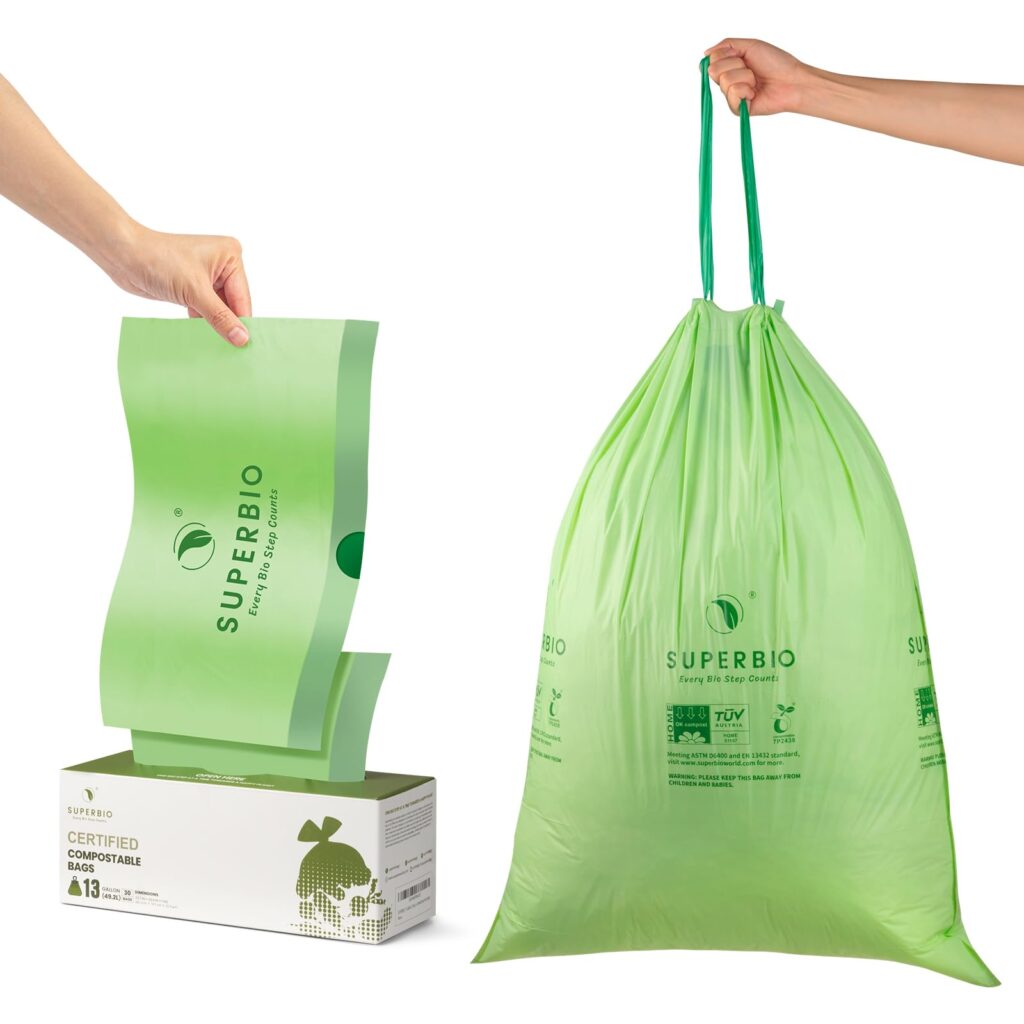
Compostable and convenient, these bags are great for those committed to sustainability.
Pros:
- Strong and durable
- Certified compostable
- Drawstring for easy handling
Cons:
- Limited shelf life
- Can puncture under pressure
- Packaging varies
We recently tried the SUPERBIO 13 Gallon Drawstring Food Waste Bags and found them quite reliable. They hold up well when used properly and their durability surprised us. Plus, the drawstring feature makes them easy to tie up and handle, even when full.
Moreover, we appreciate the compostable nature of these bags. It feels good to know that we’re reducing our environmental footprint. With certifications from OK Compost Home, OK Compost INDUSTRIAL, and SEEDLING, these bags meet high standards.
Despite their strengths, a downside is their shelf life. These bags work best within a year, so it’s best not to stockpile them. Also, you might notice varying packaging since it can come in old or updated boxes, but the product quality remains trustworthy.
9. Hippo Sak: Plant-Based Tall Kitchen Garbage Bags
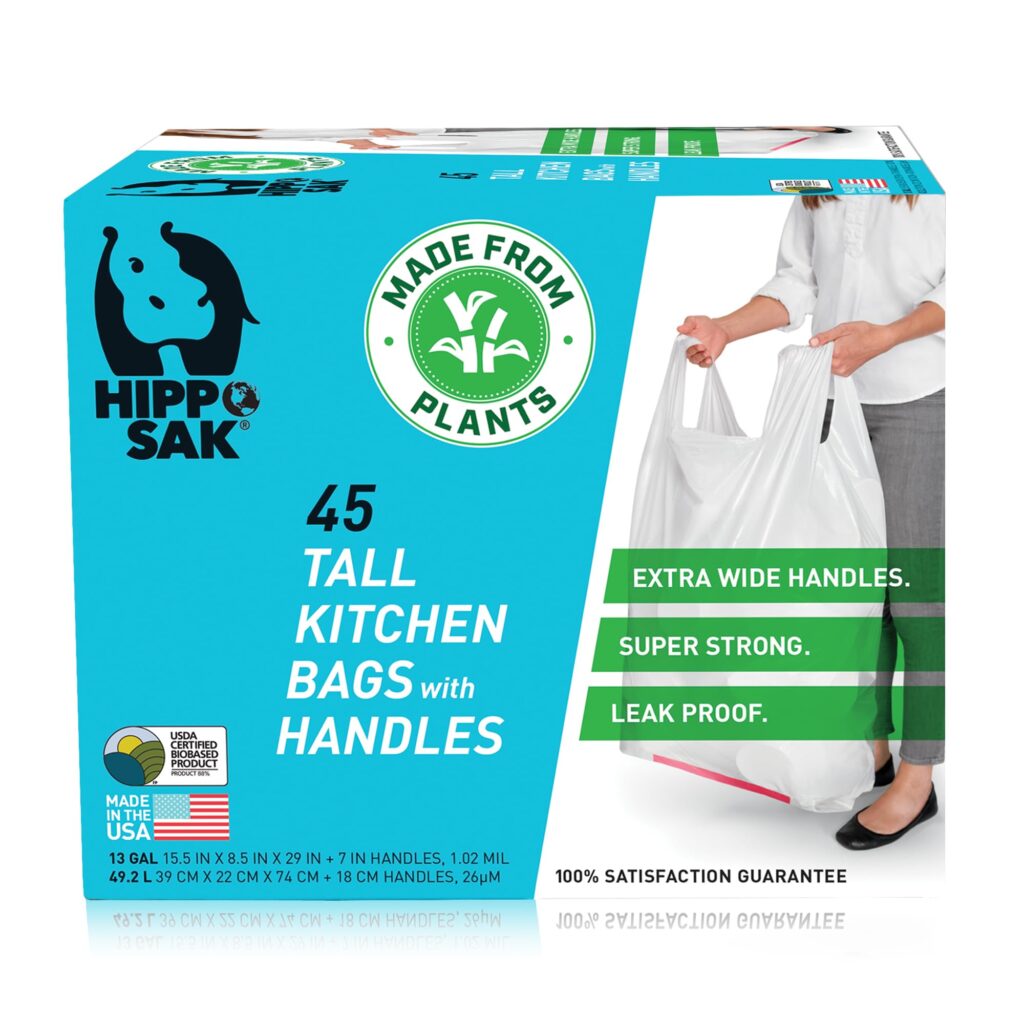
Hippo Sak Plant-Based Trash Bags are a sturdy, eco-friendly solution for your kitchen waste needs.
Pros:
- Made from plant-based materials
- Ergonomic handles for easy carrying
- Puncture-resistant and durable
Cons:
- Slightly more expensive than regular bags
- May sag when overfilled
- Some might find them too transparent
When we first tried the Hippo Sak – Plant-Based Tall Kitchen Garbage Bags, we were impressed by how easy they were to handle. The ergonomic handles make lifting and tying the bags a cinch. It was a nice change from the usual struggle with drawstrings that often cut into our hands.
We also appreciated that these bags are made from plant-based materials, which makes us feel better about our environmental impact. The fact that they are recyclable and designed to break down easily added to our sense of doing something good for the planet.
These bags are incredibly durable; they can handle our kitchen waste without any issues. The reinforced bottom helps keep the trash contained without any leaks or spills, which is a major plus for any household. If you’re looking for a reliable and eco-friendly trash bag, these are a solid choice.
10. SUPERBIO: 13 Gallon Compostable Bags
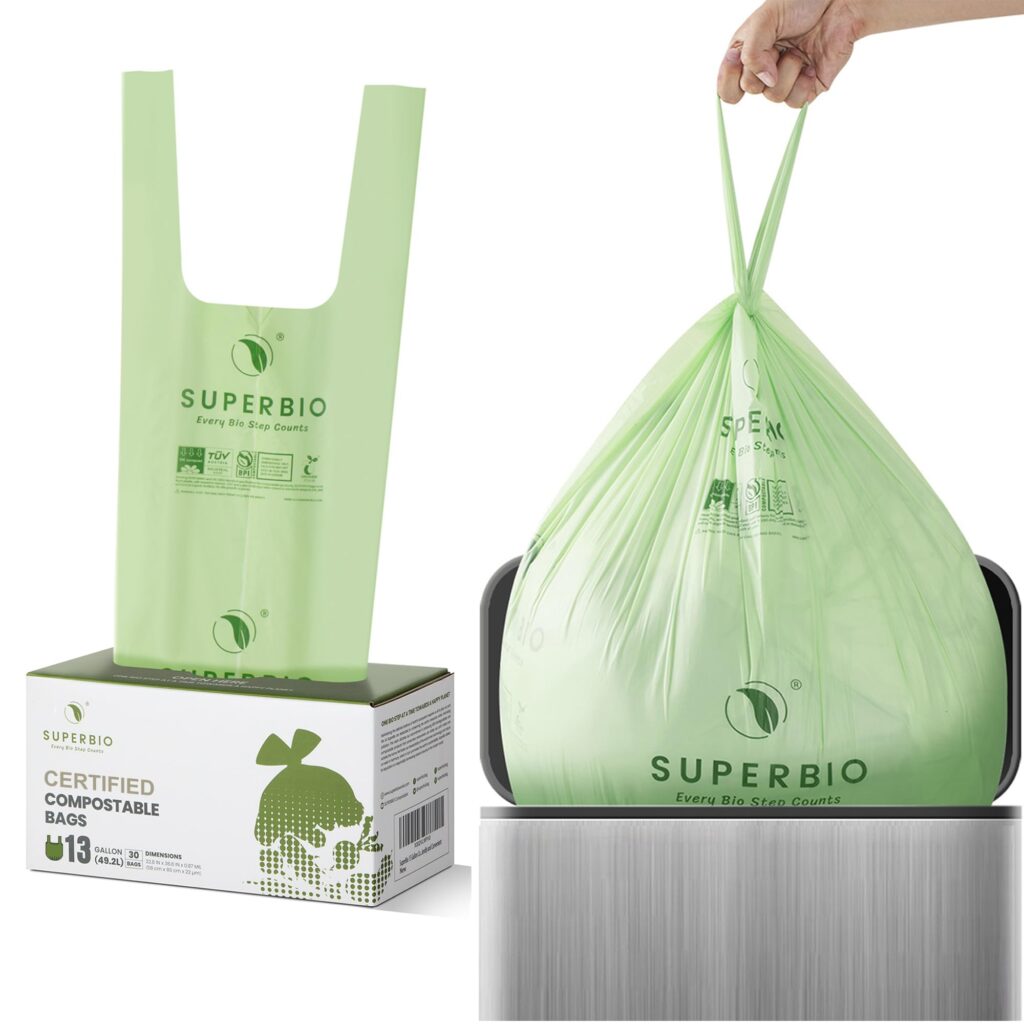
A must-buy for eco-friendly households needing sturdy and reliable compostable garbage bags.
Pros:
- Strong and tear-proof
- Convenient handle tie
- Certified compostable
Cons:
- Not for heavy-duty trash
- Limited shelf life
- Some variability in packaging
Using the SUPERBIO 13 Gallon Compostable Bags has been a positive experience. They’re strong and tear-proof, perfect for regular kitchen waste. The handle ties make carrying and disposing of the bags easy and mess-free.
These bags are a great choice for anyone looking to reduce their environmental impact. They’re certified compostable, so you can trust that they will break down properly. Given their certifications, we feel confident using them for our food scraps and kitchen waste.
One thing to keep in mind is their shelf life. They need to be stored in a cool, dry place and used within a year. When holding organic waste, especially with strong acidic or alkaline content, make sure to dispose of it within three days.
Buying Guide
When choosing compostable garbage bags, it’s important to consider several factors to ensure they meet our needs.
Material
Look for bags made of plant-based materials like cornstarch or potato starch. These materials break down more easily than plastic.
Certifications
We should check for certifications such as the ASTM D6400 or EN 13432. These indicate the bags meet strict compostability standards.
| Certification | Description |
|---|---|
| ASTM D6400 | US standard for compostability |
| EN 13432 | European standard for compostability |
Size
Compostable bags come in various sizes. We need to pick a size that fits our garbage bin. Common sizes include:
- Small (2-3 gallons)
- Medium (8-13 gallons)
- Large (30+ gallons)
Strength
We should choose bags that can hold up to regular household waste without tearing. Some bags offer extra reinforcement or double layers for added strength.
Thickness
The thickness of the bag is often measured in microns. Bags between 15-20 microns are typically better at holding wet or heavy waste.
Cost
Compostable bags can be more expensive than regular plastic bags. It’s a good idea to compare prices and consider buying in bulk to save money.
Decomposition Time
We should look for bags that decompose quickly, typically within 3-6 months in a composting environment. This ensures they don’t linger in landfills.
By considering these factors, we can make an informed decision when purchasing compostable garbage bags.
Common FAQ
In this section, we’ve gathered the most frequently asked questions to provide you with quick answers and helpful information. Whether you’re new to eco-friendly living or just looking for more details on sustainable products, we’ve got you covered. Explore these common questions to better understand how you can make environmentally conscious choices in your everyday life.
How do compostable garbage bags work?
Compostable garbage bags are designed to break down naturally in composting environments, as opposed to traditional plastic bags that persist for a long time. These bags are typically made from renewable plant materials such as cornstarch, sugarcane, or other biodegradable polymers. Here’s how they work:
- Material Composition: Compostable bags are made from materials that are certified to break down into natural elements when exposed to specific conditions, like moisture, temperature, and bacteria, found in composting environments.
- Biodegradation: Under the right conditions (such as in industrial composting facilities), compostable bags start to break down into carbon dioxide, water, and organic matter. This is different from traditional plastics, which do not break down and instead can persist in the environment for hundreds of years.
- Composting Process: When compostable bags are disposed of in compost bins, they begin to degrade due to microbial activity. The bag will typically break down into smaller particles that integrate into the compost pile, where they eventually turn into humus (a rich, organic material that can be used to improve soil health).
- Time Frame: The time it takes for compostable bags to break down depends on the environment. In an industrial composting facility, the bags may break down within 3-6 months. In home compost bins, it might take longer due to less controlled conditions.
- Certification: Many compostable bags are certified by organizations like the Biodegradable Products Institute (BPI) or have a “Certified Compostable” label to ensure they meet specific standards for composting.
While compostable bags are a better option than traditional plastic, they still need the right conditions to break down properly, so they should ideally be disposed of in a composting facility rather than in a regular landfill or home compost bin without adequate conditions.
How to Start Home Composting?
Starting home composting is a simple and effective way to reduce waste and create nutrient-rich soil for your garden. Here’s a step-by-step guide on how to get started:
1. Choose a Composting Method
There are a few options depending on your space and needs:
- Traditional compost pile: For large spaces, you can create a compost heap in a corner of your yard.
- Compost bin: These are more contained and are great for smaller yards or even apartments. There are many types available, from simple plastic bins to wooden structures.
- Vermicomposting (worm composting): Ideal for small spaces like apartments, this method uses worms to break down organic matter into compost. You’ll need a worm bin for this.
2. Find the Right Location
- Choose a dry, shaded area in your yard or on your balcony (if you’re using a bin or vermicomposting).
- Make sure the location has good airflow but isn’t too exposed to the elements, especially in extreme temperatures.
3. Gather Composting Materials
Composting requires a balance of “greens” (nitrogen-rich materials) and “browns” (carbon-rich materials). Here’s a list of each:
- Greens (Nitrogen-rich materials):
- Fruit and vegetable scraps
- Coffee grounds and filters
- Grass clippings
- Plant trimmings
- Eggshells
- Manure (from herbivores)
- Browns (Carbon-rich materials):
- Dry leaves
- Straw or hay
- Shredded newspaper or cardboard
- Wood chips or sawdust (untreated)
- Small twigs and branches
4. Start Layering
- Start with a layer of coarse browns (like straw or twigs) at the bottom to promote airflow.
- Alternate layers of greens and browns. Try to keep the greens-to-browns ratio at about 1:3 for optimal decomposition.
5. Maintain the Pile
- Aerate: Turn the compost every few weeks using a garden fork or compost aerator to introduce oxygen, which speeds up the breakdown of materials.
- Moisture: The compost should be moist, like a wrung-out sponge. If it’s too dry, add water. If it’s too wet, add more browns to balance it out.
- Temperature: The compost pile should heat up as microbes work to break it down. If it’s not heating up, try turning the pile more often or adding more green material.
6. What Not to Compost
- Meat, dairy, and fish: These attract pests and take longer to break down.
- Oils, fats, and grease: These don’t break down well and can create an unpleasant smell.
- Diseased plants or weeds: These may survive the composting process and spread when you use the compost.
- Pet waste: Feces from pets can contain harmful bacteria that might not break down properly in a compost pile.
7. Harvest Your Compost
- After several months (2-6 months depending on conditions), your compost will turn dark, crumbly, and have an earthy smell. At this point, it’s ready to use.
- If you’re using a compost bin, you can sift out any large, undecomposed materials and add them back into the pile to continue breaking down.
8. Use Your Compost
- Add your finished compost to your garden, flower beds, or potted plants to enrich the soil. It’s full of nutrients that help plants grow healthy and strong.
9. Troubleshooting
- If your compost pile smells bad, it might be too wet, too green, or lacking airflow. Add more browns, turn the pile more frequently, and ensure it’s not too soggy.
- If it’s not breaking down quickly enough, ensure the right balance of greens and browns, add water, and turn the pile to help speed things up.
With time, you’ll develop a routine that suits your space and needs, and composting will become a valuable part of your sustainable lifestyle!
Top Eco-Friendly Products for Sustainable Living
Here’s a list of Top Eco-Friendly Products for Sustainable Living, including your Earthava Phone Case:
- Earthava Phone Case
Made from biodegradable materials, the Earthava phone case offers a sustainable alternative to traditional plastic phone cases, helping to reduce plastic waste while protecting your device. - Compostable Garbage Bags
Made from plant-based materials, these compostable bags provide a greener solution for waste management, reducing the environmental impact of single-use plastic bags. - Reusable Water Bottles
Stainless steel or bamboo water bottles are perfect for eliminating single-use plastic bottles. They’re durable, stylish, and help reduce plastic waste in landfills. - Solar-Powered Chargers
Solar-powered chargers harness renewable energy to power your devices, cutting down on the need for electricity from non-renewable sources. - Bamboo Toothbrushes
These eco-friendly toothbrushes are made from sustainable bamboo, offering a plastic-free option for maintaining oral hygiene. - Reusable Shopping Bags
High-quality reusable shopping bags, often made from recycled materials or organic cotton, can replace disposable plastic bags and help reduce waste. - Eco-Friendly Clothing
Sustainable clothing brands are now offering stylish garments made from organic cotton, hemp, or recycled materials, reducing the environmental impact of fast fashion. - Electric Bicycles
Electric bikes provide an eco-friendly and energy-efficient alternative to traditional vehicles, helping to reduce carbon emissions and reliance on fossil fuels. - Energy-Efficient LED Bulbs
Switching to energy-efficient LED bulbs can significantly reduce your carbon footprint by using less energy and lasting longer than traditional incandescent bulbs. - Zero-Waste Toiletries
Products like shampoo bars, biodegradable soaps, and eco-friendly razors offer plastic-free, sustainable options for your personal care routine.
By incorporating these products into your daily life, you can significantly reduce your environmental impact and contribute to a more sustainable future.

